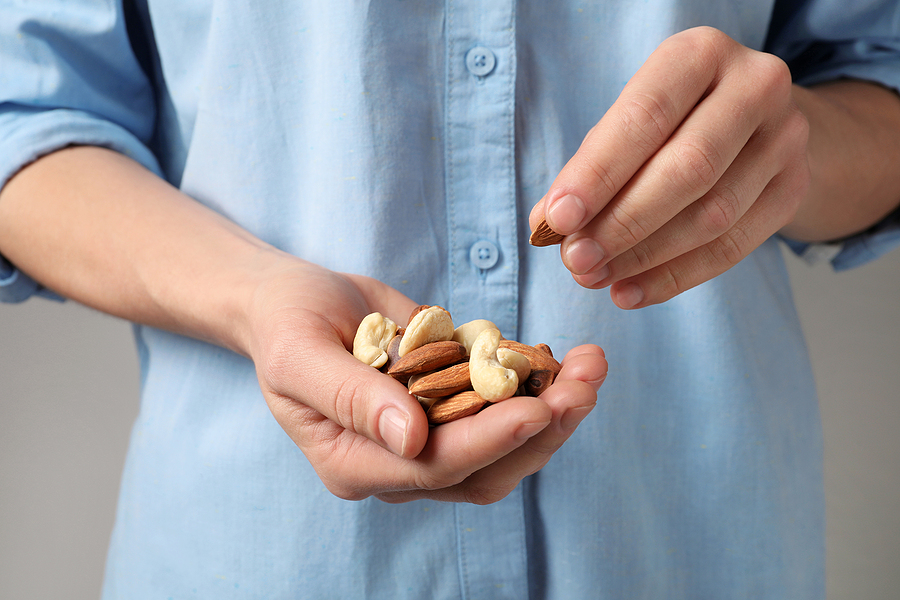Losing weight as a woman with PCOS can be a major challenge. Losing weight as a woman, especially for the long term, is a challenge to begin with! But this is a common struggle that I really wish more women and more practitioners were talking about openly.
First of all, the common, underlying issues that make weight loss more difficult with PCOS are the same issues that are behind the other symptoms associated with this condition, and getting a handle on them can make a world of a difference in terms of hormonal balance and quality of life.
And I really want women with PCOS to understand that healthy weight loss is possible! Women with PCOS don’t always respond the same way to traditional weight loss strategies as other women do, and they may have more challenges in this area, but there are solutions. Most of it comes down to understanding what’s really going on with our bodies and our hormones with PCOS, and how we can adjust our diet and lifestyle to overcome these hurdles, lose weight for the long term, and feel better overall.
Before we get into the nitty gritty details, let’s take a step back and look at what PCOS is. Characterized by a combination of symptoms that may include irregular periods, small cysts on the ovaries, hair growth on areas like the face and chin, and cystic acne, PCOS is a leading cause of infertility due to ovulatory dysfunction.
PCOS inherently affects hormonal balance. It is primarily characterized by higher than normal levels of androgens (male sex hormones like testosterone), but this generally means a much more extensive state of hormonal imbalance.
Why Is It So Hard To Lose Weight With PCOS?
Weight loss resistance is a common symptom of PCOS (by some estimates, more than half of women with PCOS are overweight), and being overweight can also make other symptoms of PCOS, like infertility, worse. There are actually all kinds of vicious cycles like this when it comes to PCOS, and that’s why it’s so important for women with this diagnosis to develop a good understanding of what is happening inside their bodies, and what they can do about it.
Many conventional doctors will just tell their patients with PCOS that they should lose weight, and not offer much in the way of how to lose weight besides recommending the standard “diet and exercise” advice. This is so frustrating, because when patients aren’t educated on the characteristics of their condition that make weight loss more difficult and how they can overcome them, they’ll often end up trying and “failing” to lose weight in all the wrong ways, and feeling completely defeated. But the truth is, it’s not these women who are “failing”, it’s the lack of real advice and guidance!
Let me just say this again. You can lose weight, naturally and sustainably, with PCOS. And I’m going to guide you through exactly how that’s possible.
A healthy approach to weight loss with PCOS begins with taking into consideration all of the different factors that contribute to weight gain and weight loss resistance with this condition.
5 Factors That Contribute to Weight Loss Resistance In PCOS
There are a number of different factors that can contribute to weight loss resistance for women who have PCOS. These factors tend to work together and feed into each other. Remember, when one thing is out of balance or harmony within the body, other imbalances are likely to be there as well. That’s why it’s so important to take a whole body, functional medicine approach to healing. Here are some of the most prevalent factors:
- Hormonal imbalances: When it comes to weight loss resistance for women in general, hormonal imbalances are often at the root. For women with PCOS, hormone levels tend to be all out of whack, which is a big reason why weight loss can be such a challenge. The hormones that regulate hunger and cravings can be off balance, as well as those that manage things like fat processing and storage.
- Insulin resistance: Most people are familiar with insulin resistance primarily as it relates to diabetes, but it’s also very common among women with PCOS. Insulin is a hormone that regulates the transport and storage of glucose (sugar) from food. Insulin resistance, which occurs when the body doesn’t respond to signals from insulin properly which causes insulin levels to increase, basically promotes fat storage rather than fat burning. If you have insulin resistance, as so many women with PCOS do, then you’re more likely to hold onto more fat than a person without insulin resistance, even if you eat exactly the same diet.
- Chronic inflammation: High levels of androgens (like testosterone) can contribute to a state of chronic inflammation, and similarly, inflammation can trigger the production of an excessive number of androgens. Chronic inflammation is a problem when it comes to weight loss and general health, and should be addressed and reduced even if weight is not a major concern for you. Many of the most effective approaches to weight loss with PCOS involve reducing systemic inflammation.
- Chronic stress & high cortisol levels: Levels of the stress hormone cortisol are often high in women with PCOS (another common representation of the overall hormonal imbalance). Cortisol has a huge impact on weight, particularly when it comes to belly fat and weight around the midsection. Actually, some women with PCOS are of a generally healthy weight, but still struggle with belly fat– this is generally because of high cortisol levels, insulin resistance, or a combination of both as the two actually feed into each other. Cortisol actually increases blood sugar levels (which increases insulin levels). Not to mention the fact that chronic stress and chronically elevated cortisol levels lead to major cravings for sugar and carbs, which make all of the other problems worse!
- Risk of other disorders: Studies have shown that women with PCOS are more likely to suffer from certain other kinds of disorders than women without PCOS, and these other disorders can contribute to weight loss resistance. For example, women with PCOS are more likely to suffer from various kinds of eating disorders (this may have something to do with the fact that there is so little good information out there about how to lose weight with PCOS!). Sleep disorders are also more prevalent among women with PCOS, which is important for a number of reasons, including the fact that poor sleep is strongly linked to weight gain and weight loss resistance. Thyroid disorders, which can also contribute to weight-related struggles, are also more common among women with PCOS.
How to Lose Weight With PCOS
The good news is, sometimes it only takes a modest amount of weight loss to have a noticeable and positive impact on hormone balance, fertility, acne, and insulin resistance (which, of course, helps with further healthy weight loss). And I’m going to tell you all of my top strategies for natural, healthy, successful weight loss with PCOS!
Tips for Building a Healthy, Balanced Diet for Weight Loss With PCOS
A lot of the research out there on PCOS talks about diets that are made up of x percent fat, x percent carbs, and x percent protein– and many of them contradict each other. What’s more, some people swear by a dramatically low-carb diet, while others insist that it doesn’t work.
It’s definitely true that there are some guidelines to follow when it comes to building a healthy diet that promotes weight loss in women with PCOS, but I want to be clear about one thing: weight loss and health are not math equations!
I want to empower women to create their own balanced diets that follow a few key principles, and work for them.
Here are some of my top tips for building a balanced diet that promotes healthy weight loss if you have PCOS.
- Reduce intake of carbs– especially the “fast” kind. Low carb diets have long been recommended (and backed up by studies) for women with PCOS, because of the role that carbohydrates play in insulin resistance. Reducing your intake of carbs is a good idea, but I recommend digging a bit deeper here and adopting a low glycemic diet. The glycemic index essentially tells us how quickly a food item raises blood sugar levels. Carbohydrates that are lower on the glycemic index (GI), often called “slow carbs”, and that are whole foods, cause less of a ruckus when it comes to blood sugar and insulin resistance, and are an important component of a well-rounded diet. Consuming slow carbs in moderation (while avoiding refined sugar and fast carbs) will also help to decrease cravings for the sweet stuff. Some good examples of nutritious slow carbs include sweet potatoes, parsnips, squash, quinoa, lentils, and beans. (But doing this can honestly be a game changer for your symptoms.)
- Include lots of healthy fats. Studies have shown that high fat diets can assist in weight loss for women with PCOS. Healthy fats keep you feeling full and satisfied or longer, and they can help with insulin resistance and weight loss, as well as things like heart health and mood. Remember to choose healthy fat sources like avocados, olive oil, wild-caught fatty fish, and nuts.
- Eat plenty of protein. Protein is extremely important when it comes to stabilizing blood sugar and keeping you feeling full after meals. Research has shown that eating a relatively high protein diet can be an effective way to lose weight when you have PCOS. Make sure to choose high-quality sources like organic meat, poultry, and eggs, and nuts.
- Don’t forget about fiber. In the United States, fiber intake is a huge problem. Hardly any women are consuming as much as we need! Fiber is so important for reducing insulin resistance, helping you to stay full, and lowering total body fat.
- Avoid sugar and processed foods. Processed foods and foods with added sugar are notorious when it comes to raising blood sugar levels and increasing insulin resistance. Research has shown that women with PCOS may actually experience even more dramatic blood sugar spikes following the consumption of these foods than women without the condition. Quitting sugar is hard, but it is really one of the best things you can do to improve your health and facilitate weight loss with PCOS.
- Limit gluten, dairy, alcohol, and caffeine. Gluten and dairy are common dietary sensitivities or intolerances among women with PCOS, even though many doctors never uncover this. They’re known to be inflammatory, especially if you’re sensitive to them. It can be a good idea to try an elimination diet and see how you feel. Alcohol and caffeine can also contribute to imbalances including high cortisol levels and insulin resistance, and should only be consumed in moderation if at all.
- Don’t be too restrictive. Because weight loss resistance in PCOS is so common, many women are driven to the edge when diets don’t work, and might end up undereating or restricting calories to the point of malnourishment out of desperation. Not only is this generally unhealthy, but it increases stress (which throws hormones and everything else even more off balance), and research has shown time and again that rapid weight loss due to very restrictive diets doesn’t last. Focus on the quality of what you’re eating more than how many calories you’re taking in.
Other Tips for Natural Weight Loss With PCOS
- Work on sleep. Sleep disturbances including sleep apnea, daytime sleepiness, and insomnia are more common for women with PCOS than women without, especially among those who are overweight. Lack of good quality sleep can affect weight in a number of ways, including increasing insulin resistance and inflammation, causing cravings, interfering with hunger hormones, and making you less likely to exercise. Consider how you might be able to improve your quality of sleep, maybe by avoiding blue light and electronics at night, limiting caffeine during the day, trying guided relaxation or meditation exercises before bed, investing in blackout curtains, or sipping on chamomile tea in the evening. It’s also a good idea to speak to your doctor and be screened for obstructive sleep apnea, especially if you feel like you are excessively sleepy in the daytime and if you have high blood pressure.
- Balance the gut microbiome. The makeup of bacteria in your gut have a huge impact on everything from body composition, metabolism, nutrient absorption, insulin resistance, and cravings. If your gut microbiome is out of balance, weight loss and optimal health will be hard to achieve. All of the dietary tips mentioned above will help, as well as adding probiotic foods like yogurt, kefir, and kombucha, and prebiotic foods (which feed the good bacteria) like onions, leeks, garlic, asparagus, and fennel into your diet. You may also want to take a probiotic supplement.
- Exercise regularly. Women with PCOS may lose less weight than those without as a result of exercise, but research has shown that it does still help. Besides, the other health benefits of exercise are astronomical! Regular cardio exercise as well as weight training have been found to be helpful, but I always recommend finding some kind of exercise that you truly love in order to get the best results.
- Address stress and adrenal fatigue. High cortisol levels have a codependent relationship with insulin resistance and weight gain, and the best way to address them is to manage chronic stress and address any underlying adrenal dysfunction. We have tons of advice on healing from adrenal fatigue naturally on our website, and I think you’ll find it helpful!
- Get your thyroid checked. PCOS and thyroid imbalances often go hand in hand, but many women are only diagnosed with one of them, and are left in the dark about the other. Learning about any underlying thyroid issues can make a huge difference when it comes to determining how to restore balance within the whole body, and lose weight naturally. Because of the limited testing methods and reference ranges offered by conventional doctors, it’s best to see a functional medicine practitioner for a comprehensive thyroid panel and a more detailed and nuanced interpretation of the results.
- Look into supplements. Some supplements, including myo-inositol, can help to lower insulin resistance and promote healthy weight loss. Some research has also shown that the amino acid carnitine can help with weight loss for women with PCOS. Speak to your functional medicine practitioner about which supplements, if any, might be especially helpful for you.
I’ve worked with so many different women on achieving healthy weight loss, and I know that it’s possible to get there if you have PCOS. This condition requires a unique set of strategies as outlined above that help to lower inflammation, reduce insulin resistance, decrease cortisol levels, and balance hormones in order to get to an optimal weight and state of wellbeing.








